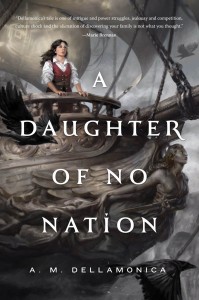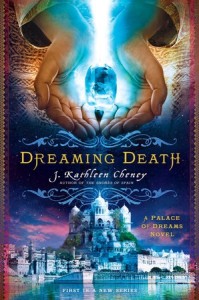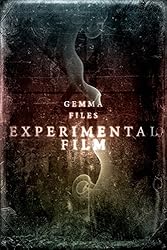 It can be tricky to know what to say about a book on its birthday, particularly if it is not the shiny debut of a series. I don’t want to spoil Child of a Hidden Sea for anyone who hasn’t read it yet, after all. Even so, I want to say a few things about where the story picks up in A Daughter of No Nation.
It can be tricky to know what to say about a book on its birthday, particularly if it is not the shiny debut of a series. I don’t want to spoil Child of a Hidden Sea for anyone who hasn’t read it yet, after all. Even so, I want to say a few things about where the story picks up in A Daughter of No Nation.
It has been six long months. Sophie Hansa is at home, trying as best she can to prepare herself for what she hopes will be a not too distant return to the world of Stormwrack. She’s attempting to learn skills that mesh with Age of Sail technology, to ensure that she’s fit, healthy, and ready to face a range of physical and mental challenges. There’s endurance training. Knot tying. Re-upping her CPR. Astral navigation. Memorizing everything from A Standard Book of British Birds to simple experiments from the history of science. As the book opens, that’s what we where we find her.
Anyway, I thought it might be fun to right now invent a rundown on what everyone else has been up to:
Bramwell Hansa, for example, is as intrigued by Stormwrack’s existence as Sophie herself. Is it an alternate Earth? A future one? Why does magic seem to work there? Wait… seem? Clearly it does, but how? He’s been been working with his sister on the data they have gathered so far, teaming up develop research plans for any future expeditions. Because, you see, they have to know.
My first impulse was to say that it all been rather nose to grindstone for poor Bram–that he hasn’t been dating. But I think all of you who keep telling me how much you love Bram will agree he could use a nice fellow in his life. Six months, though… he can’t have had anything too dramatic going on, or his sister would have noticed, and cared, and talked it to death. He’s not in a relationship when the book opens, and there’s nothing about recent drama in A Daughter of No Nation. So… was it all science and no play? Did Bram meet someone–have it flare and then fizzle? You tell me. I’m open to to anything, as long as it’s consistent with Bram’s character and what I’ve got on the page.
Sophie’s half sister, meanwhile, definitely isn’t getting any. Come on, guys–Verena’s so young! Anyway, she’s got a huge unrequited crush on a certain tasty ship’s captain, and she’s not about to let that go anytime soon. Also, she’s adjusting to her new job. It’s a big job and she’s completely inexperienced, so naturally, a few mistakes have been made. Good thing the boss isn’t a hardass, right? She is? Well, that’s awkward…
As for the Nightjar crew and Captain Parrish, I’ve got to tell you that they have been having a rough time of it. They lost someone important to them in the first book, as you may remember, and the past half year has served both as a mourning period and an upheaval. Life and work go on, as they must, but the rhythms are changed, and not everyone’s able to dance to the new beat. In fact, the medic and the bosun have both thrown up their hands and quit.
So for Garland and Tonio in particular, things feel precarious. That’s how it is when you lose the people who matter most to you. The ground crumbles underfoot. Everything in life is, simply, harder.
Finally, there’s the Fleet’s chief Duelist, Judge-Advocate Clydon Banning of Sylvanna, legal eagle and sword fighter extraordinare. He isn’t even faintly bereaved. Someone died? Did I kill them? No? Then why are we discussing this, exactly?
Cly has been a busy busy boy. He has taken a leave of absence, dug deep into a bunch of musty legal codes and old lawsuits, and even reviewed his will. He has demanded and earned the equivalent of a higher security clearance from his government, and then elbowed his way into the club of higher-ups holding onto Stormwrack’s most tightly guarded secrets. Put another way, he has obliged the Convene of Nations to tell him about the existence of Earth. Now he is considering how he might best exploit this newfound knowledge… and Sophie, inevitably, will be the key to all his plans.
Do you have a favorite Stormwrack character who’s not included in this roundup? Let me know and I’ll give you a hint about what they’ve been up to.
Second books aren’t always about charm. Sometimes they’re about rolling up your sleeves, raising your fists and damnwell plunging your characters so deep into the dip you might never get them out again. A Daughter of No Nation has tall ships, sirens, man-eating cats, teenage con artists in love, dryads, slaves, leech attacks, tedious dinners with frightful cousins–because danger has many flavors–a really nasty kudzu infestation and the resurrection of a dead conspirator on Issle Morta, island of the judgey monks.
Doesn’t that all just kinda scream holiday gift?






